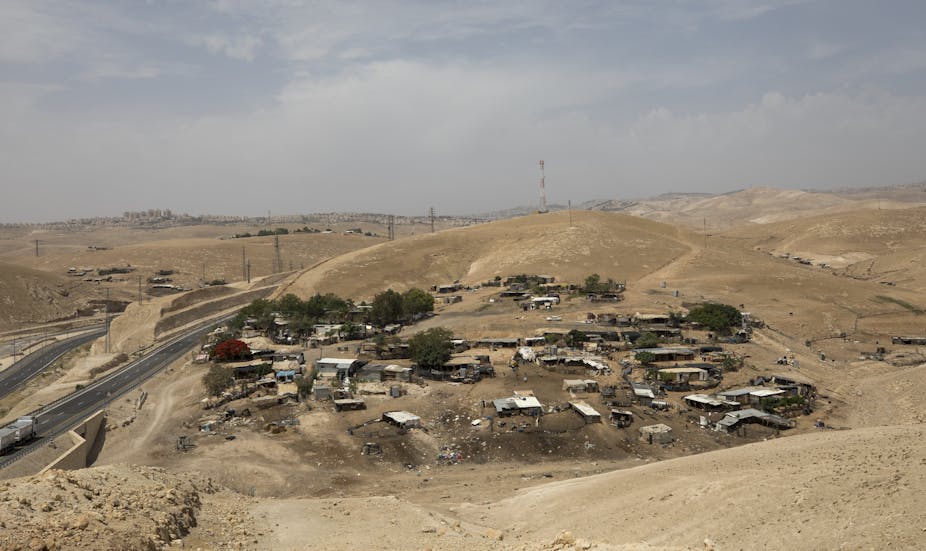The village of Al Khan al Ahmar is home to 180 people on the West Bank of Palestine. It has 40 houses, a mosque and a school built from old tyres and mud. But its residents don’t know if their village will still exist tomorrow – after Israel confirmed plans to demolish the Bedouin settlement.
If the demolition does go ahead, it could amount to a violation of international humanitarian law. Forcible transfer of civilians living under occupation, demolition of Palestinian homes, and the expansion of settlements all violate the Fourth Geneva Convention.
According to some human rights organisations, destroying the village might also be considered a war crime under the Rome Statute of the International Criminal Court – something which the rest of the world has a responsibility to prevent.
It was on May 24 2018 that the Israeli Supreme Court put a summary end to the Al Khan al Ahmar judicial saga in Israel. Three judges (with direct personal links to Israeli settlements) authorised the state to proceed with the demolition. It could happen any time now, despite the community which lives there having nowhere to go.
That tiny Bedouin community has been fighting a legal battle since 2009, when a donor-funded school built of used tyres and mud was ordered to be demolished. The case later expanded into plans to remove the entire village.
The argument of the Israeli state – now endorsed by the court – is that none of the makeshift structures in Al Khan al Ahmar were ever granted planning permission. Applications for permits were submitted by the villagers numerous times, but invariably refused. As a result, it is impossible for the community (and other Bedouin villagers in the area) to build anything “legally” according to Israeli law.
Israel’s power in the West Bank is based on a temporary regime of military occupation established in 1967 at the end of the Six Day War – not on any form of legitimate authority. According to international humanitarian law, occupation does not give sovereignty, and any attempt to alter the demographic profile of occupied territories is prohibited.
For too long now the Israeli Supreme Court has exercised its jurisdiction over Al Khan al Ahmar and other Palestinian Bedouin villages in the West Bank. A sober appraisal of this scenario would indicate the need for an impartial international tribunal, independent from the Israeli state, to consider the international illegality of the planned demolition.
Indeed, in 2017, International Criminal Court prosecutor Fatou Bensouda, listed Israeli plans “to relocate Bedouin and other herder communities … through the seizure and demolition of residential properties” as potential war crimes that may fall under the court’s jurisdiction.
Israel’s plans to demolish the village present a perfect opportunity for foreign governments to reaffirm their commitment to human rights and the international rule of law.
Time for legal pressure
The world cannot afford to look away while Bedouin communities like Al Khan al Ahmar are erased to make way for the Israeli settler project.
Under the Geneva Conventions, while there is no specific action mandated for third parties, countries committed to international law cannot remain idle when faced with serious violations. Third state responsibility must be effective.

For a start, states cannot simply accept an illegal situation which results from a serious violation of international law. There must be accountability for these violations.
Foreign countries now have an opportunity to acknowledge the unwillingness of the Israeli courts to carry out a genuine investigation into the violation of international law in Al Khan al Ahmar – and a duty to endorse the ICC’s preliminary investigations into demolitions in the West Bank.
This is a tragic story of perverse justice, and it’s time for the international community to put its weight behind the ICC.
So far, some of the signs have been encouraging. In the US, 76 members of the House of Representatives have signed a letter to Prime Minister Netanyahu, urging him to halt the demolitions. The letter states:
The destruction and displacement of such communities would run counter to shared US and Israeli values, while further undermining long-term Israeli security, Palestinian dignity, and the prospects for peacefully achieving two states for two people.
France has expressed “deep concern”, Germany is “extremely worried” and the EU as a whole has raised the issue with Israeli authorities.
In the UK, the foreign secretary, Boris Johnson, has urged Israel not to proceed with the demolition and other ministers have visited Al Khan al Ahmar and issued strong statements against the Israeli Supreme Court’s decision.
Royal role
It is encouraging that the UK government has spoken up – especially about a region severely damaged by the legacy of British colonialism.
Yet at a time of escalating bloodshed in Gaza, Prince William is about to visit Israel as a representative of the UK government amid reports of a thriving arms trade between the two countries.
There are of course many more ways in which the UK can uphold its obligations, including intervening on the arms trade and other collaborations with Israel that enable settlement activity which is driving Bedouin displacement.
At the very least, when Prince William visits the region on behalf of the UK government, a visit to Al Khan al Ahmar should be high on the agenda.

